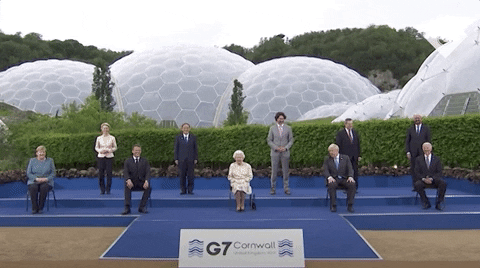Democracy on the Beach
Sun, sand, and reasons to be cheerful: a contrarian view of the G7 summit.
Welcome to New World Same Humans, a weekly newsletter on trends, technology, and society by David Mattin.
If you’re reading this and you haven’t yet subscribed, then join 17,000+ curious souls on a mission to build a better shared future 🚀🔮
🎧 If you’d prefer to listen to this week’s instalment, go here for the audio version of Democracy on the Beach. 🎧
Here in the UK, we hosted this G7 summit this week.
If nothing else it’s produced some beach pictures that our elected representatives can cherish forever.
But it also felt a moment to pause and reflect. On the hard problems we face as a human collective in 2021, and what we’re doing to solve them.
The result is a contrarian, unexpectedly optimistic view of the summit and its outcomes. Read on!
The leaders of the world’s seven richest liberal democracies gathered, this week, in Cornwall on the southwestern tip of England.
Something about the unlikely beach setting, the vast blue skies, and the pandemic backdrop have combined to make this the most surreal summit of nations I can remember. Watching the Global North’s most powerful humans exchange elbow bumps on the sand, it sometimes felt as though this meeting was the long first scene in a novel by JG Ballard.
Seen another way, the whole thing has had strong new summer hit by Lorde energy.
The leaders gathered amid huge problems. While vaccine programmes are kicking in across the Global North, elsewhere the pandemic rages unchecked. We’re halfway through 2021, and there have already been as many COVID deaths this year as there were in all of 2020.
Meanwhile, there’s a newly assertive China. Overmighty technology companies. And, of course, climate change.
And yet, amid all the diplomatic absurdities, I find reasons for qualified cheerfulness in the long run.
In advance of this week’s summit, G7 finance ministers agreed a landmark new global tax framework, intended to stop the tax avoidance practised by techno-corporate giants such as Amazon.
On China, Biden is pushing a new Build Back Better World plan as an alternative to China’s Belt and Road. The plan will see G7 countries invest hundreds of billions of dollars in infrastructure across Africa and South America.
G7 leaders pledged this week to move away from coal-burning power stations at home, and the end the funding of them in the developing world. The Global North wants to get its carbon affairs in order before the crucial COP26 UN Climate Change Conference in November, and it’s not doing a bad job. Back in April, both the UK and the US made striking new pledges on emissions.
Meanwhile, the summit closed with a promise to donate 1 billion vaccine doses to the developing world.
Before you start to think that the weak English sun has gone to my head, some caveats.
There are a lot of pledges here, and pledges are only talk, which is cheap. Let’s see what is delivered.
And for every promise made, interest groups are lining up to point out that more is needed. The minimum corporation tax rate laid out by the new global framework is 15%; Oxfam says that is far too low. New support announced for developing nations to address climate change still doesn’t add up to the $100 billion that G7 nations promised years ago. And Covax, the WHO body responsible for global equitable access to the vaccine, says 11 billion doses are needed if we are to meet the goal of vaccinating 70% of the global population by the time the G7 meets next year.
You’ll hear much talk, in the coming days, of the G7 summit as another missed opportunity. Former UK prime minister Gordon Brown has said the promise of only 1 billion vaccine doses amounts to an ‘unforgivable moral failure.’
And the thing is, many of these complaints are entirely legitimate. Many of them, both the letter and the spirit, are hard to disagree with in any straightforward way.
But in this strangest of G7 gatherings, I can’t help but see glimmers of hope. Take a step back from the politics of this moment and attempt a longer view, and isn’t there evidence of progress on our greatest shared challenges?
The world’s oldest democracies are tired, care-worn, and stunned by the cataclysm that is COVID. But out of the wreckage they are mustering some semblance of the monumental cooperation that will be needed to rebuild, and finally to meet the existential threat posed by a warming planet. Rewind back to 2016, and some feared that the Global North’s ability to manage this kind of cooperation was in terminal decline.
Yes, our response to climate change remains imperfect, and incomplete. But those who said, not so long ago, that we’d never mount any meaningful response are being proven wrong. Yes, we need many more vaccine doses, and a plan to distribute them fairly. But let’s not forget that the novel coronavirus was discovered only 18 months ago; that we have a vaccine at all is a kind of scientific miracle.
Whenever it is asked why we are yet to find intelligent life out in the vastness of space, some give an ominous reply. This lack of alien cosmic cohabitants, they say, points to the idea that advanced civilisations tend to destroy themselves before they reach technological maturity.
Whatever the real merits of that answer, it’s one that taps into a deep-seated fear peculiar to we inhabitants of modernity. That is, the fear that the great advances we are making will, in the end, be our undoing. That just around the corner is the self-inflicted wound that will prove fatal: the nuclear confrontation, the terminally heated climate, the pandemic that we can’t end.
That fear will never leave us. And probably, it’s a useful survival mechanism.
But among the lessons of the last 18 months is an unexpected and welcome one. A reminder of our incredible ability to cooperate at scale, and to create compounding gains that make us ever more able to solve hard problems. The messenger RNA technology that led us so quickly to a COVID vaccine is a powerful example.
No one can know for sure how far we’ll take the human story. Or if, indeed, we can solve the pressing challenges that are in front of us right now. But as this week draws to a close I find myself, unexpectedly, a little more optimistic about our prospects.
Solar power
Thanks for reading this week.
The New World Same Humans community is united around the idea that in the 2020s, we shouldn’t leave our shared future to the powers that be.
Instead, we should come together to build a better future for all. I hope this newsletter helps fuel your mission to do just that.
And there’s one thing you can do to fuel our community in turn: share!
If this week’s instalment resonated with you, why not forward the email to someone who’d also enjoy it? Or share it across one of your social networks, with a note on why you found it valuable. Remember: the larger and more diverse the NWSH community becomes, the better for all of us.
I’ll be back on Wednesday with New Week Same Humans. Until then, be well,
David.




